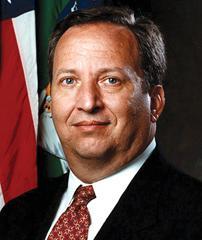Lawrence Summers, director of the National Economic Council, spoke in the Rafik B. Hariri Building on Friday about the necessity of increased financial regulation as the United States emerges from the recession.
Summers began his address at the recently opened Hariri Building by describing how the government’s recovery plans and stimulus program have led to an economic rebound. He warned that immediate recovery would not last, however, without serious alterations to how the government oversees financial institutions.
“New regulatory approaches are critical because a failure to change the rules of the road will result in future crises that will adversely affect the lives of millions and cost taxpayers untold sums,” Summers said.
Summers outlined several potential changes to the regulatory system. He said that the government plans to require financial institutions to acquire more capital before they begin to lend and borrow freely, and that institutions must be forced to prepare backup plans in case they encounter financial trouble.
“Our financial system will not be fail-safe until it is safe for failure,” Summers said.
Financial regulations must also be uniformly applied to all institutions based on the nature of the institutions, Summers said. “Financial stability is not attainable so long as institutions can choose their own regulator and play regulators against one another,” he said.
Along with regulations for major financial institutions, Summers explained that while the government will not be directly involved in overseeing small businesses that lend credit to consumers, it would look for an independent consumer protection agency.
“Contrary to some advertisements you may have seen, we have no desire to interfere with Main Street retailers’ ability to provide credit to their customers,” Summers said.
Summers’ remarks come as President Barack Obama and his advisers look to tighten government control over the nation’s largest financial institutions. In the next week, the president will attend meetings at the United Nations in New York City and the Group of 20 summit in Pittsburgh to discuss global regulation reform.
“We believe that this is the year – after all that has happened – to overhaul our system of financial regulation and put in place a structure that can respond to contemporary challenges,” Summers said.
Olga Sologub (MSB ’12), who attended the lecture with her business law class, said she felt that Summers’ message about emerging from the recession was both cautious and optimistic.
“He said that this is not going to be an instantaneous occurrence. But he made it sound like it was possible and that we are moving in the right direction,” Sologub said.
Solugub also said that she found the lecture relevant as reports are just beginning to surface about the end of the recession.
“Because [the economic rebound] is occurring right now, it is wonderful to be the first recipients of this information,” Sologub said.
The National Economic Council, created in 1993 by President Bill Clinton (SFS ’68), is an advisory agency composed of high-level administration officials and Cabinet members that coordinates White House economic policy. Summers, the council’s eighth director, previously served as secretary of the Treasury under Clinton and president of Harvard University.
“








